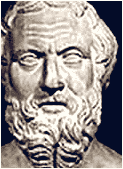Herodotos on the Trojan War
 From Book 1.
From Book 1.
This is the Showing forth of the Inquiry of Herodotus of Halicarnassos, to the end that neither the deeds of men may be forgotten by lapse of time, nor the works great and marvelous, which have been produced some by Hellenes and some by Barbarians, may
lose their renown; and especially that the causes may be remembered for which these waged war with one another.
1. Those of the Persians who have knowledge of history declare that the Phoenicians first began the quarrel. These, they say, came from that which is called the Erythraian Sea to this of ours; and having settled in the land where they continue even now to dwell, set themselves forthwith to make long voyages by sea. And conveying merchandise of Egypt and of Assyria they arrived at other places and also at Argos; now Argos was at that time in all points the first of the States within that land which is now called Hellas; --the Phoenicians arrived then at this land of Argos, and began to dispose of their ship's cargo: and on the fifth or sixth day after they had arrived, when their goods had been almost all sold, there came down to the sea a great company of women, and among them the daughter of the king; and her name, as the Hellenes also agree, was Io the daughter of Inachos. These standing near to the stern of the ship were buying of the wares such as pleased them most, when of a sudden the Phoenicians, passing the word from one to another, made a rush upon them; and the greater part of the women escaped by flight, but Io and certain others were carried off. So they put them on board their ship, and forthwith departed, sailing away to Egypt.
2. In this manner the Persians report that Io came to Egypt, not agreeing therein with the Hellenes, and this they say was the first beginning of wrongs. Then after this, they say, certain Hellenes (but the name of the people they are not able to report) put in to the city of Tyre in Phoenicia and carried off the king's daughter Europa;--these would doubtless be Cretans; --and so they were quits for the former injury. After this however the Hellenes, they say, were the authors of the second wrong; for they sailed in to Aia of Colchis and to the river Phasis with a ship of war, and from thence, after they had done the other business for which they came, they carried off the king's daughter Medea: and the king of Colchis sent a herald to the land of Hellas and demanded satisfaction for the rape and to have his daughter back; but they answered that, as the Barbarians had given them no satisfaction for the rape of Io the Argive, so neither would they give satisfaction to the Barbarians for this.
3. In the next generation after this, they say, Alexander the son of Priam, having heard of these things, desired to get a wife for himself by violence from Hellas, being fully assured that he would not be compelled to give any satisfaction for this wrong, inasmuch as the Hellenes gave none for theirs. So he carried off Helen, and the Hellenes resolved to send messengers first and to demand her back with satisfaction for the rape; and when they put forth this demand, the others alleged to them the rape of Medea, saying that the Hellenes were now desiring satisfaction to be given to them by others, though they had given none themselves nor had surrendered the person when demand was made.
4. Up to this point, they say, nothing more happened than the carrying away of women on both sides; but after this the Hellenes were very greatly to blame; for they set the first example of war, making an expedition into Asia before the Barbarians made any into Europe. Now they say that in their judgment, though it is an act of wrong to carry away women by force, it is a folly to set one's heart on taking vengeance for their rape, and the wise course is to pay no regard when they have been carried away; for it is evident that they would never be carried away if they were not themselves willing to go. And the Persians say that they, namely the people of Asia, when their women were carried away by force, had made it a matter of no account, but the Hellenes on account of a woman of Lacedemon gathered together a great armament, and then came to Asia and destroyed the dominion of Priam; and that from this time forward they had always considered the Hellenic race to be their enemy: for Asia and the Barbarian races which dwell there the Persians claim as belonging to them; but Europe and the Hellenic race they consider to be parted off from them.
Next installment: The Persian's side of the story.




0 comments:
Post a Comment